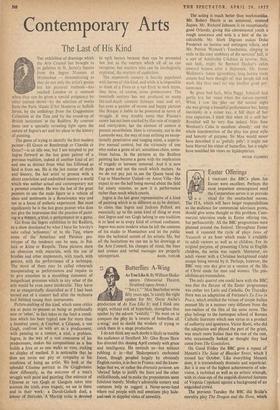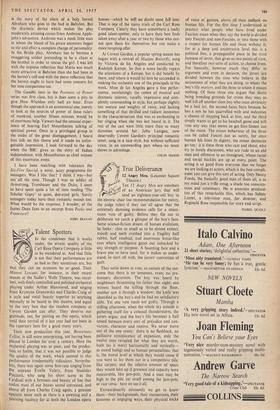Easter Offerings
THOUGHT the BBC's plans for Easter were excellent. Perhaps the most important unrecognised need the Corporation serves is to provide
o o ritual for the unattached masses.
The ITA, which will have larger responsibilities as the trudience for commercial television grows, should give some thought to this problem. Com- mercial television made its Easter offering too, but perfunctorily. All the BBC programmes were planned around the festival. Throughout Easter week it repeated the cycle of plays Jest's of Nazareth at an hour which made it available to adult viewers as well as to children. For its original purpose, of presenting Christ to English children, the series was superb. Moreover, no adult viewer with a Christian background could escape being moved by it. Perhaps, however, the BBC may one day give us a version of the life of Christ made for men and women. The pos- sibilities are tremendous.
The only quarrel one could have with the BBC was that the flavour of the Easter programmes was zather too Latin and Catholic. On Thursday there was an adaptation of Forzano's To Live in Peace, which extolled the virtues of simple Italian peasant life in a manner very different from the neo-realism of the film of the same name. The play belongs to the homespun school of Roman Catholic literature which sees virtue as a product of authority and ignorance. Victor Rietti, who did the adaptation and played the part of the priest, was much more Italian than the rest of the cast, who occasionally looked as thought they had come from The Gondoliers.
On Good Friday the BBC gave a repeat of Menotti's The Saint of Bleecker Street, which I missed last October. Like everything Menotti does, it is tremendously dramatic and superficial. But it is one of the highest achievements of tele- vision, a technical as well as an artistic triumph, with its close-ups of the anguish-distorted features of Virginia Copeland against a background of an anguished crowd.
The previous Tuesday the BBC did Bridie's morality play The Dragon and the Dove, which
is the story of the niece of a holy hermit Abraham who goes to the bad in Babylon. But the dramatic device which makes the play moderately amusing comes from Ambrose Apple- john's adventure. Ambrose was a meek little man in whom the blood of his pirate ancestors began to stir and effect a complete change of personality. In the Bridie play, Abraham has to become a swaggering soldier pretending to be a client at the brothel in order to rescue the girl. I was left with the impious reflection that Maria was much more attractive in Babylon than she had been in the hermit's cell and with the pious reflection that the hermit ought to have had some concern for her nine companions too.
The 'Gandhi item in the Portraits of Power series was first class, but it does seem a pity to give Huw Wheldon only half an hour. Even though the approach is an economical one, merely to look at the sources of power of these rulers of mankind, another fifteen minutes would be of enormous help. Viewers had the unusual exper- ience of hearing Earl Mountbatten talking of spiritual power. Once in a privileged group in the midst of the great disengagement, I heard him talk on this theme and it made an unfor- gettable impression. I look forward to the day when the BBC gives us the story of Indian independence, with Mountbatten as chief witness of this enormous event.
I have been watching with tolerance the Six-Five Special, a noisy, jazzy programme for teenagers. Was I like that? I think I was—but not all the time. Though I was an addict of Armstrong, Trumbauer and the Duke, I seem to have spent quite a lot of time reading 'The Scholar Gipsy' to quiet, doe-eyed girls. Surely teenagers today have their romantic moods too. . What would be the response, I wonder, of the James Dean fans to an excerpt from Paolo and Francesca?
JOHN BEAVAN































 Previous page
Previous page